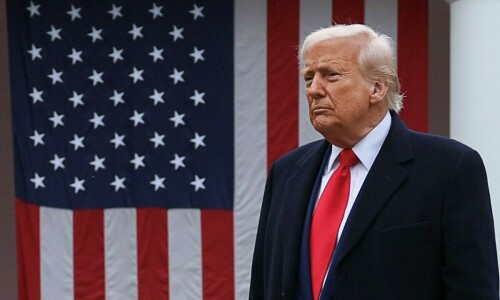WASHINGTON, Oct 6: The final report of the chief US weapons inspector for Iraq, submitted to Congress on Wednesday, says that former Iraqi president Saddam Hussein did not pose a serious threat to the United States and he did not possess or have plans to develop weapons of mass destruction.
"I still do not expect that militarily significant WMD stocks are cached in Iraq," Charles Duelfer, the CIA special adviser who led the hunt for weapons of mass destruction, said in a testimony prepared for the Senate's armed services committee.
It is still unclear that how much of the 1,500-page report prepared by Mr Duelfer and his team will be made public. Mr Duelfer's predecessor, David Kay, who resigned last December, also found no evidence of weapons of mass destruction in Iraq.
The Bush administration had justified the Iraq invasion by claiming that the deposed Iraqi ruler was a threat to the United States and that he possessed weapons of mass destruction.
The report contradicts both the claims and is expected to further fuel the debate over Iraq between President George Bush and his Democratic challenger John Kerry.
Mr Kerry accuses President Bush of invading Iraq without a plan to retreat and says that he misled the Americans by making false claims. President Bush, however, has continued to assert in his campaign speeches that Iraq had posed 'a gathering threat and that the former Iraqi ruler did have weapons of mass destruction'.
The final US report on Iraqi WMDs has enough material for both and could easily be spun by their campaign managers to justify their respective positions on Iraq. As expected, White House spokesman Scott McClellan told reporters that the report's findings support the military action taken by President Bush, even though stockpiles of weapons of mass destruction have not been found.
The report says that Saddam Hussein had the desire but not the means to produce WMDs, and had he not been sanctioned by the United Nations, he could have acquired those weapons. But the report concludes that Iraq's weapons-development programme was less advanced in 2003, when the war began, than it was in 1998, when the UN inspectors left Iraq.
Mr Duelfer, an experienced weapons inspector who has worked both for the UN and the US government, has also included comments the former Iraqi president made after his capture.
Saddam Hussein reportedly told his captors that he ruled his country for more than two decades and survived the Iran-Iraq war and the 1991 US offensive because he had WMDs.
The report, however, says that although Saddam Hussein did not have the means to make these weapons, he had never given up his plans to acquire them. Mr Duelfer said that his Iraq Survey Group had uncovered Iraqi plans for ballistic missiles with ranges from 400 to 1,000 kilometres and for a 1,000km range cruise missile, farther than the 150-km range permitted by the United Nations.
The report says that the Iraqi intelligence agency used clandestine labs to manufacture small quantities of biological weapons in recent years. Such weapons, however, were for use in assassinations and were too small to be used against another country, the report said.
The report includes names of individuals and companies - many from China, Russia and France - that had traded illegally with Iraq. Meanwhile, in a quarterly report to US Congress, also submitted on Wednesday, the State Department said that as little as 27 per cent of the fund meant for Iraq's reconstruction was actually used for that purpose.










































